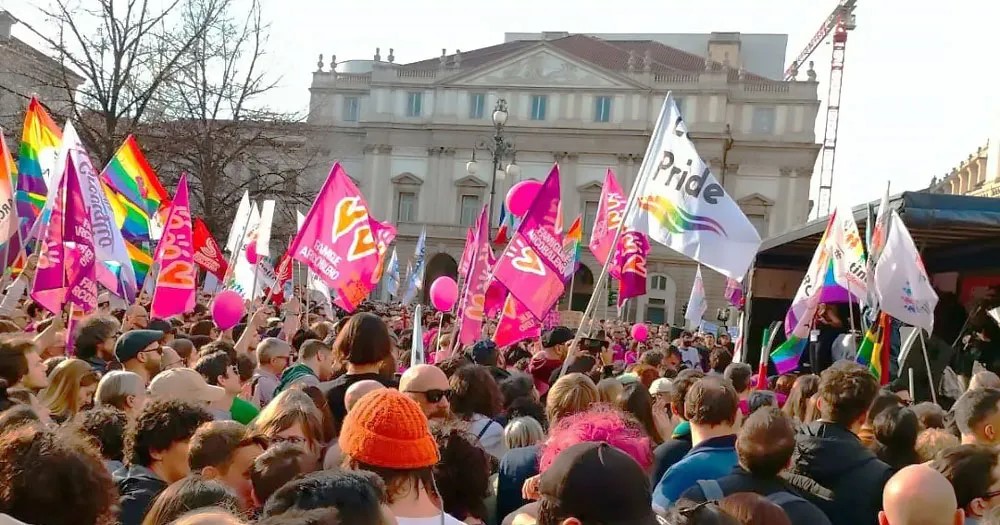Attacks on LGBTI rights in Italy are human rights violations, Commissioner reports

Amid legislative attacks on LGBTI rights in Italy, a new report by the Council of Europe Commissioner for Human Rights, Dunja Mijatović, calls on the Italian government to protect everyone from hate and violence
Since the new Italian government came into power in 2022, it has been toying with the rights of LGBTI people. Draft legislation that would do away with the internationally agreed protection of asylum seekers based on their sexual orientation and/or gender identity has been put forward, as well as guidelines that have led to the deregistration of lesbian mothers in several Italian cities, the drafting of a law to penalise surrogacy conducted abroad with criminal sanctions, and attempts to intimidate teachers supporting trans children in schools.
A new report by the Council of Europe Commissioner for Human Rights, Dunja Mijatović, clearly names the discontinuation of transcriptions of foreign birth certificates of children born from surrogacy or artificial reproduction technology, and the lack of protections for LGBTI people against discrimination and hatred, as human rights violations. It calls on the Italian government to step up protection of LGBTI people and their families, and to protect everyone in Italy from hate and violence.
The country report on Italy, released last week, is based on a visit the Commissioner undertook in June of this year. It addresses the topics of asylum and migration, women’s rights and gender equality, freedom of expression, safety of journalists, protection from hate crime and hate speech based on SOGIESC, and children’s rights.
Attacks on children’s rights
Addressing children’s rights, the Commissioner highlights the recent attacks against rainbow families in Italy. In January 2023, the government issued a Directive instructing local authorities to discontinue the automatic transcription of foreign birth certificates of children born through surrogacy and inviting them to register only the biological parent. A second Directive was later issued, clarifying that the these guidelines should also be followed in cases of children born following other artificial reproduction technology.
Some prosecutors began to retroactively challenge the transcription of foreign birth certificates of children born to same-sex parents. In Padua at least 33 mothers of 37 children received notification that their child(ren)’s birth certificates, in which two women’s names appeared, were illegitimate. In many cases, the deregistration comes after many years, and the children thus ‘lose’ one mother, and sometimes their family name, from one day to the other.
While the government claims that parents have a legal route to establish parentage of the second parent, namely via a special adoption procedure (“adozione in casi particolari”), LGBTI organisations have long pointed out that these procedures can take up to years, are very costly and depend on the courts, which vary from region to region.
The European Court of Human Rights clearly ruled that states need to establish a mechanism to allow for recognition of the parent–child relationship for non-genetic parents, such as through adoption, and that children should not be blamed for their parents’ decisions, including about conception. In her report, the Commissioner confirms that the Italian procedure does not comply with the best interests of the child and reminds that even Italy’s Constitutional Court recommended the legislation be amended accordingly to ensure adoption rights for all families without discrimination.
In the absence of legally ensured adoption for all, the Commissioner calls on Italy to stop deregistering parents, as some prosecutors have started to do in a response to the governmental Decree.
The attacks on rainbow families must be seen in the context of broader attacks by the government on the LGBTI community in Italy and their fundamental rights. Schools have been called upon to no longer accept the gender identity of trans children in education, the draft law proposing to withdraw the possibility to seek asylum based on prosecution based on sexual orientation and gender identity is still on the table, and LGBTI-phobic hate speech, including from politicians, has been on the rise.
Anti-LGBTI speech and hate crime
In the light of the rise in LGBTI-phobic hate and violence, the Commissioner highlights the lack of national level anti-discrimination, anti-hate speech and hate crimes legislation covering sexual orientation, gender identity, gender expression and sex characteristics (SOGIESC) grounds and calls on the Italian government to fill this legislative gap. The Commissioner highlights in particular the need to improve awareness of and response to violence against LBTI women.
The Human Rights Commissioner highlights the importance of consistent application of the legal asylum framework concerning the protection of vulnerable persons. According to us, this clearly also applies to the worrying moves of the Italian government to remove SOGI as protected grounds in the asylum law. Under EU law, Italy has several obligations to provide protection to vulnerable groups, including those based on sexual orientation and gender identity.
The Commissioner’s report is yet another voice of international institutions raising concerns about how the Italian government is failing to protect the human rights of LGBTI people and instead is more and more using LGBTI people as pawns in political games, putting them at risk of violence and discrimination. The attacks by the government are a reminder that only legal protections such as adoption rights for same-sex couples can ensure that the fundamental rights and the best interest of all children to have their parents recognised are guaranteed – legal protection that Italy is largely lacking. The lack of legal protections for LGBTI people has resulted in Italy being one of the lowest ranking EU Member States on ILGA-Europe’s Rainbow Map – placing at 22 out of 27 EU member states currently.
Together with Italian LGBTI organisations and activists, ILGA-Europe will continue to call on the Italian government to reconsider its current anti-LGBTI actions and decisions and work to advance legal protection, especially in the area of non-discrimination, family recognition and protection against hatred and violence.